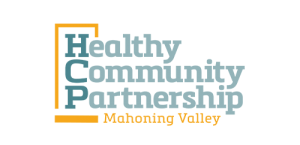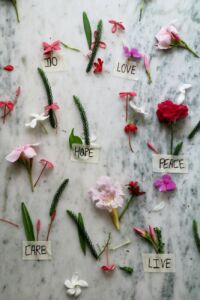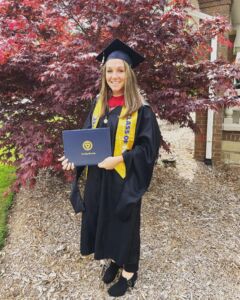HCP-MV Moment of the Month: Turning the Tassel
Student Researchers Complete Capstone Projects
“Education is the most powerful weapon which you can use to change the world” – Nelson Mandela
In order to achieve the Healthy Community Partnership’s ambitious, Bold Goals and mission to improve health, wellbeing, and health equity in the Mahoning Valley, the following items must be included in the mix:
- New, fresh perspectives, data, and leadership
- Time and other hard to come by resources
So, whenever the Healthy Community Partnership is asked if we would want to work with students who are curious and care about health, wellbeing, and health equity, we enthusiastically say, “yes!”
Student researchers provide the Partnership and other similarly structured cross-sector coalitions with opportunities to fulfill these two critical components. They bring new eyes, ears, and minds to old, tired, persistent problems. Their research fills gaps in data, invites different questions or audiences into the conversation, and builds on foundational work and relationships that should be revisited and revised regularly.
Questioning with curiosity and listening to learn reveals paths forward that otherwise were invisible or not yet charted. The results from student-lead research projects have the potential to help propel the Partnership’s work forward by both broadening and deepening our understanding within our focus areas.
But, the Partnership also wants to make sure the growing and guiding goes both ways.
Many of the student research superstars who have worked with us are in public health programs. Working with the Partnership is a different experience than a more traditional organization like public health departments, hospital systems, or private health care providers. The collective impact approach to the Partnership’s work creates opportunities for students to interact with those more familiar organizations but also includes community and economic development agencies, resident leaders, local government representatives, educators, entrepreneurs, philanthropic foundations, and more.
This approach, we hope, enables students of any discipline to see that the impact of their work is as wide as the outstretched arms of our partners, working together to support our community. Much like the saying, “it takes a village to support a child,” the Partnership believes it takes a community to support a community.
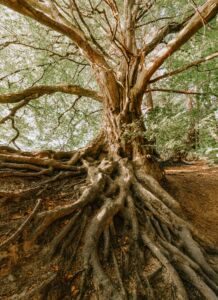
“The true meaning of life is to plant trees, under whose shade you do not expect to sit” – Nelson Henderson
We also know a valuable lesson afforded all involved in these partnerships is the need to practice patience.
“The true meaning of life is to plant trees, under whose shade you do not expect to sit” – Nelson Henderson
Living in a time where results are expected yesterday, and simultaneously, the problems of yesterday continue to impact generation after generation, patience is more rare and precious than ethically-sourced diamonds.
Partnership membrs have accepted that the work we are doing today to improve health outcomes and the conditions that influence them is soil preparation and seed planting at best. We may see a few seeds begin to wiggle up from the soil and open their first set of leaves while their roots begin to take hold. But, as far as collecting and celebrating a bountiful harvest, dramatic improvements in weight status, chronic health conditions like diabetes and hypertension, mental health, and racial health equity? We’ll have to wait a little while for those flowers to bloom before reaping the fruits of our labor.
However, these are not the only measures of progress and success. Partnership members will see, and have already seen, change and growth in other critical areas related to how we work together: new approaches to projects and policies pursued; partnerships propagated; trust and tenacity achieved between sectors and stakeholders; changing long held practices, procedures, and positions; becoming comfortable being uncomfortable; confronting root causes like racism and other oppressive forces, and more.
These milestones also take a lot of time, intention, and attention. This resource intensive process can also show up as growing pains for some, but this is part of the necessary process of change and transformation. Students play a vital role in this process by continuing to nurture core curiosities about why things are they way they are and how to find new paths forward, new solutions, and new information. Cycles are natural parts of evolutionary processes, but it is important not to get stuck in a rut.
All the more reason why working with students–the next generation of “growers” and “seed sewers”–is so important.
This spring, the Partnership had the honor and pleasure of working with two incredible students–Brooklyn Bennett and Celeste Murray–whose work unearthed new insights and shined a new light on areas of the Partnership’s work to date. For their efforts, the Partnership is incredibly grateful and hopeful that these two bright minds find opportunities to blossom and flourish in their fields and inspire others to cultivate the same sense of caring and curiosity for their communities.
“If your plan is for one year plant rice. If your plan is for ten years plant trees. If your plan is for one hundred years educate children. ”–Confucius
Brooklyn Bennett, Kent State University, Building Capacity: Insights for Implementation of the Warren Parks Program
About Ms. Bennett: Ms. Bennett is from Leavittsburg, Ohio and earned a B.A. from Kent State University in Journalism: Advertising/Public Relations/Social Communication in 2019. Her capstone research project capped off her graduate studies at Kent State University, where she recently earned a M.A. in Public Relations in May 2021. She currently works in Trumbull County as a Children’s Services Community Liaison.
Project Presentation | Final Report
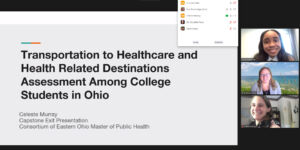
Screenshot from Ms. Murray’s Capstone Presentation in May 2021. Pictured from Top to Bottom: Celeste Murray, Kim Trowbridge (Capstone Coordinator), Sarah Lowry (Community Preceptor)
Celeste A. Murray, Consortium of Eastern Ohio Master of Public Health, Transportation to Healthcare and Health-Related Destinations Assessment Among College Students in Youngstown, Ohio
About Ms. Murray: Ms. Murray earned a BA in psychology from California State University–Sacramento in 2017. She recently completed a Master’s of Public Health degree at Youngstown State University, which is a member of the Consortium of Eastern Ohio Master of Public Health program. During her MPH program, Ms. Murray specialized in Healthcare Administration and Management. She also works part-time for Bon Secours Mercy Health as a Patient Access Specialist.
